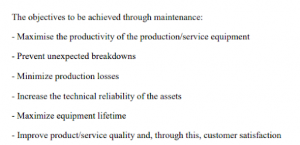Lesson 2 – The system of maintenance activities – purpose and need for maintenance
In this lesson, we delve into the significance and rationale behind maintenance of machinery and equipment.
Introduction to Machinery Maintenance
- Machinery maintenance has evolved with the machinery industry but varies across time, space, and cultural contexts.
- It plays a critical role in ensuring the longevity and efficiency of machinery.
Factors Influencing Maintenance
- Maintenance philosophies differ globally and are shaped by factors like resource scarcity and economic conditions.
- The development of technology and safety standards is elevating the importance of skilled maintenance professionals.
Aim of Machine Maintenance
- The primary objective of machine maintenance is to maintain equipment in optimal working condition.
- Scheduled maintenance is crucial to avoid production downtime, which can increase production costs.
The Need for Maintenance
- Maintenance is necessitated by the dynamic nature of machinery and materials, where components may require repair or replacement during a machine’s lifespan.
- Key objectives of maintenance include maximizing productivity, preventing unexpected breakdowns, minimizing losses, enhancing technical reliability, prolonging equipment life, and improving product/service quality.
Impact of Maintenance on Machine Operation
- The planning and execution of maintenance, including repair technologies and timelines, can significantly affect machine performance.
- During maintenance, certain technical indicators related to machinery operation may improve.
Collaboration Between Production and Maintenance
- The activities of production plants are crucial in achieving the desired technical condition of machines.
- Manufacturers are investing in research and technology to improve product quality, but the post-design phase often receives less attention.
Challenges Faced by Maintenance Specialists
- Maintenance specialists face complex challenges that demand theoretical and practical expertise.
- Understanding original objectives and methods for achieving new goals is essential in reviewing maintenance plans.
Diverse Organizational Forms
- Maintenance can be directly linked to the production company, be a part of a manufacturing company, or operate as a separate entity with its own activities.
- Environmental concerns are driving the need for equipment that minimizes the disposal of subcomponents and auxiliary materials.
Economic Considerations
- While it may not be cost-effective to repair certain items like light bulbs, more complex machinery components are often replaced instead of repaired.
- The decision to repair or replace a machine depends on various factors, including cost-effectiveness and production downtime.
Conclusion
- Maintenance is a critical aspect of machinery management, impacting both efficiency and economics.
- Decisions regarding maintenance and machine replacement are complex and depend on a variety of factors.

Read the textbook from the 9th page. You can find the textbooks’s content on this link.